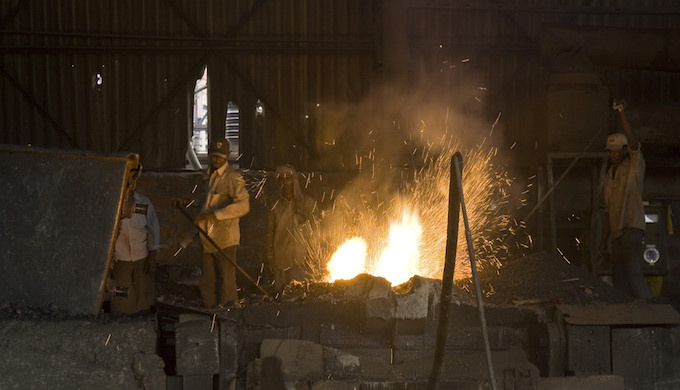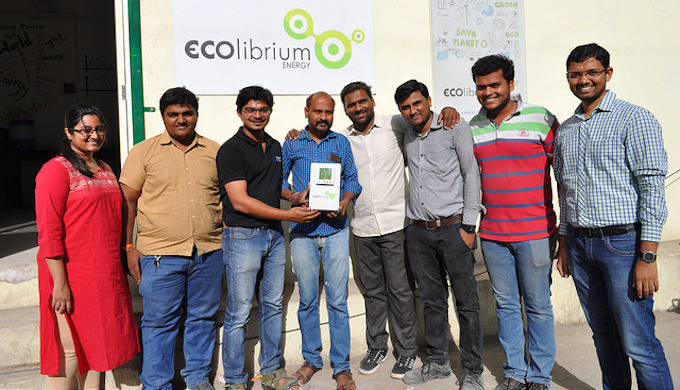Ahmedabad-based Ecolibrium Energy has won one of the prestigious Ashden Awards this year by offering a product to boost energy efficiency in industrial production by using big data in innovative ways

There is a need for more efficient use of energy in industrial units. (Photo by Ken)
Depending on intensive industrialisation to fuel its development, India faces the challenge of pursuing growth while having a minimal impact on the environment and natural resources. As nearly 20% of industrial energy is wasted or mismanaged, improving energy efficiency is a good way for industries to cut their carbon footprint and costs, and Ahmedabad-based Ecolibrium Energy is helping many companies to do that. Its efforts have won it one of the Ashden Awards – the world’s leading green energy prize – this year.
Ecolibrium Energy uses an innovative method of big data and predictive energy analytics to improve efficiency and reduce carbon emissions. “Ecolibrium’s business intelligence technology demonstrates how the power of big data can make a significant difference when it comes to monitoring and optimising energy use,” the Ashden judges said. “With Ecolibrium Energy’s technology, which can be applied across many different operations, large businesses – including blue chip clients – can understand, control and massively reduce their energy costs.”
Through sensors and its cloud-based software system, Ecolibrium’s big data energy analytics platform – called Smart Sense – gathers data to find energy inefficiencies at various stages of the production line in industries and suggests solutions to tackle power wastage.
“The key problem with businesses is that they want to improve energy efficiency on their premises but they don’t know the right way to do it. Smart Sense creates a platform for monitoring the energy consumption across the facility,” Harit Soni, Founder and Director of Ecolibrium Energy, told indiaclimatedialogue.net. “It takes the data of electricity, fuel, water, production on a cloud-hosted platform and then it does predictive machine learning algorithms which can identify losses which are happening within the industrial building as well identifying any potential downtime of key equipment, such as motors, transformers.”
The process consists of two parts, data collection and analytics that gets translated into actionable solutions. The implementation part of the sensor system has also been made easy and simple to use for the industries. The system can be integrated with existing energy meters. The time needed to implement Smart Sensor ranges from a couple of hours to two weeks, depending on the size of the industrial unit, according to Ecolibrium. It takes one more month after that to study the energy leakages, wastage areas and generate recommendations to plug the gaps.
In a country where a third of the population suffers from frequent power cuts lasting several hours, Ecolibrium Energy is addressing the need for demand-side energy management. The company is helping more than 750 commercial and industrial consumers and utilities in South Asia to save up to 15% of their energy and maintenance costs.
Energy optimisation
Explaining the positive results in energy savings, Soni said, “We see anywhere up to 15% of energy optimisation with industries. We have clients across sectors. We have pharmaceutical clients, engineering clients. We see savings anywhere from 2% to 15% on both the energy costs as well as the maintenance costs.”

The Ecolibrium Energy team celebrating the award. (Photo by Ashden Awards)
Ecolibrium Energy works with global brands such as Coca Cola, which has been questioned on its inefficient use of groundwater resources in India. Inefficient companies are “the most interested” in adopting energy saving projects like Smart Sense, Soni says.
“They’re very inefficient in the way they use water but it’s a problem that we can solve, and that’s something that excites us because if somebody is being inefficient, they might be able to gain the maximum from our systems,” he told indiaclimatedialogue.net. “We work with Shell and you could argue that Shell is one of the largest emission producers in the world, but they also want to change that image and the operations they have. Similarly, Coca Cola also wants to change that whole image as well so they are trying doubly hard to have sustainability targets. That’s where we pitch in and say that this is how technology can help you, and it’s exciting. We have just started working with a few Coca Cola plants to make a success story out of it and now we are talking to them about replicating it in locations across the world, which is where the real value of that comes in.”
Expanding business
Smart Sense clients are primarily from India; some are from the Middle East and Malaysia as well. The company now plans to take its expertise to Europe and the US. “I believe the technology we’ve built in India is cutting edge and might be better than some competitors in this area in Europe. And we want to show that we can do something better, cheaper and faster,” said Soni.
Started in 2001, the Ashden Awards are given to pioneers in sustainable energy and is bundled with prize money of GBP 20,000 (USD 25,530) and support to help scale up their work. Till date, Ashden has rewarded more than 200 enterprises around the world which are said to have collectively improved the lives of some 80 million people, saving more than ten million tonnes of carbon dioxide emissions every year.
Industrial energy efficiency is key to sustainable development for combating climate change and as one of the winners of the prestigious award, Ecolibrium Energy hopes that the award will generate awareness and will help in expansion of the green venture globally.
“We have been able to create a substantial impact in this sector in India and we hope the association with Ashden will be a step towards replicating this model globally, towards our vision of creating a world where every watt counts,” Soni said. “Ashden has a supporting ecosystem, which is the key because it doesn’t stop at the awards ceremony. It goes on from there and that’s exciting for us because when we want to expand from India to an international market, we need people to handhold us. And we look at the Ashden group as one of those resources that we can use to build that platform to spring across to other places.”
